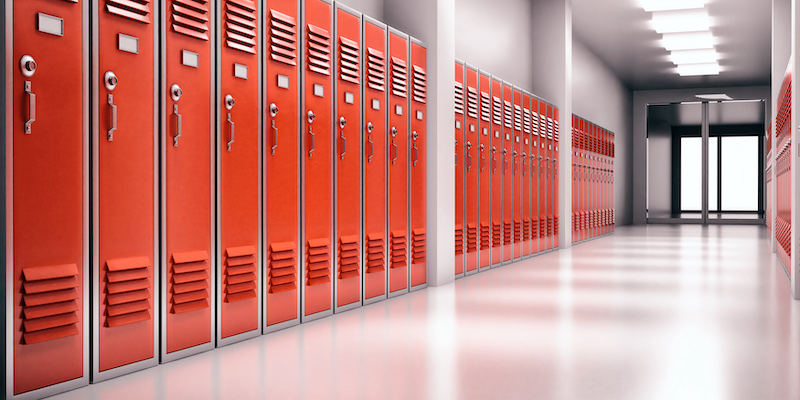Yes.
That’s an entirely unsatisfying answer, so let’s go into more detail.
Which high school you attend correlates with how likely you are to graduate, what scores you’ll get on standardized tests, whether you’ll go to college, and if you do, which you’ll end up attending. Some of these are unrelated to the high school itself, while others are causative relationships. In this article, we’ll explore how your high school impacts your future, and what it means to attend a “good” high school.
Public vs. Private High Schools for College Acceptance
A recent article by Slate discusses how private schools advantage some students in the college admissions process. The main takeaway from the article is that a plurality (though not a majority) of students attending Ivy League and Ivy+ colleges attended private high schools.
This is notable because the percentage of students at Ivy League schools who attended private high school is far greater than the overall percentage of students who attend private schools vs. public ones in the US. Approximately 10% of students attend a private high school. This is far less than the 40% of Harvard undergraduates who attended a private school.
This does still mean that the majority of students at Ivy League schools attended public high schools, but raises questions as to whether or not private high schools do a better job of preparing their students for college and positioning them for success. While some of them do, there are numerous factors to consider.

The Benefits of Private School
Just because private schools seem more likely to send students to a top college does not mean all private schools are better than all public schools. The top private schools have more resources and offer more opportunities than the top public schools, but most private schools are not substantially better than the public schools they replace.
What makes one school better than another? The resources they are able to provide. What determines these resources? Money. Money, as the Simpsons so eloquently put it “can be exchanged for goods and services.”
A school with more resources will have smaller class sizes, more options for courses, more advanced courses, more elaborate art, music, and specialized programs, more educational trips, better materials in the classroom, and more extracurricular support and options.
These all add up. Smaller class sizes and more academic support lead to increased academic performance. More advanced courses prepare students better for college and standardized tests. Extracurricular support and options give students more chances to explore their passions and to demonstrate their inherent talents to colleges. These all line up well with what colleges are looking for in applicants.
Thus top private schools are designed to prepare students for college and to shape them into the sort of scholars and people that colleges are eager to admit. This does not mean all private schools are created equal, however.
How Top Private Schools Stay That Way
Top private schools often have strict requirements for admission, requiring proof of maturity, academic preparation, and capacity. Many of these can be overcome by enrolling children in school early, but low-performing students will be shuffled out eventually.
Top private schools are also very expensive, costing tens of thousands of dollars per semester, and often fundraising on top of that. While it is possible to buy your way into some of these schools, money alone is often not enough, especially for the highest performing schools. This doesn’t mean that being rich doesn’t help, merely that the entire group of people competing for space at the school is rich as well.
Lower-ranking and achieving private schools are far less selective, though still are more selective than public schools, which take every student. The top private schools provide a major boost to college admissions chances, while those in the middle of the pack and below don’t perform any better than public schools.
Not All Public Schools are the Same
Public schools are funded by local property taxes. Thus, in areas with higher real estate prices, the schools are better funded. As with private schools, the more funding a school has, the better it is able to prepare its students for college.
That said, public schools must take all students who live within their zoned district. This makes them (generally) far less able to control which students they serve than private schools. The exception is selective magnet schools, which are able to take the cream of the crop, and which generally have remarkable resources and student success.
The best public schools, either magnet or otherwise, are equal to private schools when it comes to preparing students for college. Thus the perceived benefit from private schools in college admissions is one of correlation: schools with more resources are better able to prepare students for college, and private schools are more likely to have more resources.
While some schools truly are better than others, in the end, the average success of a student comes down to how many resources are invested in them. Turning a child into a scholar is a long process, and requires patient work from skilled educators. The more resources these educators have to work with, and the fewer students they have to focus on, the better the end results will be.
What Parents Can Do
All parents want to set up their children for success, and getting them into good schools is a great first step. In this section, we’ll describe the concrete steps you can take to ensure your child gets a great education.
Your first step should always be your local public schools. Your tax dollars pay for them, and many public schools provide a wonderful education. Not all public schools are great, however, as we discussed above. If you want a quick overview of a school, search for “School Name school report” on Google.
This will take you to a school’s report, a document the school counselors create and send to colleges. It includes an overview of the school’s standardized test scores, how many students graduate, and how many go to college. While standardized test scores are not a perfect measure, they are a good way to quickly get a sense of a school’s quality and to compare schools.
If the public schools local to you are not up to par, then you should consider magnet schools, charter schools, or private schools. Each of these has pros and cons but can provide a great educational experience.
Public magnet schools are incredibly competitive, but often provide some of the best educational opportunities in a city. Charter schools can be great, or terrible, just like public schools, so you should look into them carefully before taking the plunge.
Some private schools are better than others, and the better they are, the more competitive admissions can be. Many private schools are also religiously affiliated, which heavily impacts the culture of the school. We recommend making sure you are ok with a private school’s culture and values before enrolling your child.
We’ve created a guide to the best high schools in Houston, in order to help you know what schools to look at. While the guide is not exhaustive, it covers regional public schools, public magnet schools, secular private schools, and religious private schools. We recommend you research schools on your own as well, because you know your child and their needs best.
Final Thoughts
There is an advantage in college admissions for students who attend elite private schools. The amount of resources these schools have to invest in educating and preparing students for college is immense, and this in turn greatly increases these students’ chances of admission. Public schools are able to do this as well, but again, the amount of resources these schools have access to is generally the best predictor of the outcomes for their students.
Applying to college is stressful for students and parents alike, but parents often start worrying far earlier. Finding the right high school can ease this stress, letting parents be confident in the knowledge that their student is being prepared for college by experts. We’ve created a guide to the best high schools in Houston, in order to help parents know what schools to look at. If you want more advice on finding the best high school for your student, schedule a free consultation today. We’re always happy to hear from you.








